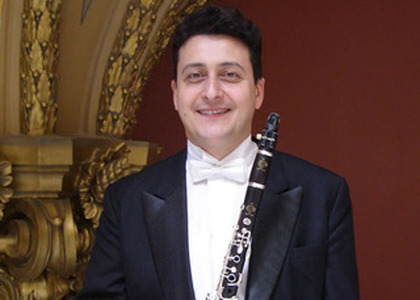> [Archived] Interviews

Interview with clarinetist Emil Visenescu
Tomorrow night's concert of the Radio Chamber Orchestra is part of the agenda of the "International New Music Week" Festival. Among the soloists who will perform on the stage of the Radio Hall is the clarinetist Emil Vișenescu, who will present the Concerto for clarinet and orchestra "De simplici duplex II" by Diana Rotaru.
We find out more details from the clarinetist Emil Vișenescu:
On Wednesday evening, you will perform with the Radio Chamber Orchestra, conducted by Lutz Rademacher. You will present the Concerto for clarinet and orchestra De simplici duplex II by Diana Rotaru. From your perspective, how is this score?
I will be happy to be on the radio stage again with my former colleagues and friends, members of the orchestra, and I will sing music dear to my soul, because I have sung it before. First of all, it connects me a lot with Diana Rotaru, with her artistic side. I've known her since she was very young, a student at the Conservatory. I was already a teacher and I sang more music to him, he dedicated more works to me. I felt joy every time I sang, because her music is full of color, of verve, of incredible strength. So when you look at her she is transparent, she is fine, an angelic being, but know that in her lies an incredible depth and strength. So, I fell in love with her music, I sing it with great pleasure and I return to Radio with great pleasure.
Going back to this score, can you reveal some peculiarities?
As far as I can remember, it was his diploma thesis, when he graduated from UNMB (National University of Music in Bucharest), composition class. I sang it to her in the first audition right at UNMB. It is not long (this is a great quality), but it is full of color, as I said, of strength, liveliness, verve, very funny rhythms. It is dedicated to the bass clarinet and the clarinet in B flat, so the two instruments and timbres change one by one. I have the impression that there are two interventions of each instrument. So, we have a telluric character, so to speak, evoked by the bass clarinet, full of strength as we said and deep coloring, then we have the clarinet in B flat, which has rhythms borrowed from jazz music, a very attractive and very lively music, very challenging to feel good, so it is a music that has as much telluric side as I said, very deep, earthy, low vibration and has high play and liveliness, even musical joke. Diana jokes, captures all the feelings of the human spirit, from mourning, sadness, the deep thought that people have in life, to joy, vivacity, tenderness, play, joke, sometimes sarcasm, so she has the whole range of feelings that a being human beings can experience them in life.
What does the collaboration with the "International New Music Week" Festival mean to you and how do you view it?
It seems to me an extraordinary thing that concerts and festivals resume live, with the public. This festival has a long life and we hope to continue. It is an extraordinary stimulator for the creation of new music and especially Romanian music. Hundreds of oppositions have been written for this festival and many valuable works. It is beneficial in my opinion for the whole spectrum of Romanian music. Here, we collaborate with many foreign composers who are sung here, conductors come, foreign soloists come. So, Romania is engaged in the ensemble of universal music and it is here in Bucharest a voice and not only here, but also in Cluj and in the festivals from Iași, from Brașov, from Timișoara; are festivals that frame us in universal music. It is beneficial that this festival exists. It is beneficial for both creation and performers.
I have a very close relationship with this festival, practically being present in it since its re-establishment or its restart after 1990. I can tell you that I matured with it, I think I became a deeper musician and I owe a lot to this festival and to music in general. Many performers, let's be honest, avoid contemporary music, but of course everyone has the freedom to choose. I think this option is wrong, because contemporary music does nothing but evoke exactly modern man and modern society and our type of relationship, and a musician who does not play the music of his time I think is not engaged in his time, nowadays . On the other hand, I wanted to know contemporary music and be able to decode it and present it to the public at its true value for another reason. Prey. Such as a student coming to me with a paper, telling me that he has to prepare it for an international competition or a recital, and I look at it and say, "I can't help you, because I can't I know how to decode this message, I don't know how to analyze it, to break it into parts and to reconstruct together this universe imagined by the composer ". I would have nothing to look for as a professor at the National University of Music in Bucharest. This music meant a lot to me, it fulfilled me, so to speak, artistically and even humanly.
We are waiting for the audience in large numbers, because the music deserves special attention, the world will leave the concert hall richer. I am convinced.
Translated by Medeea Alexandra Stan,
University of Bucharest, Faculty of Foreign Languages and Literatures, MTTLC, year I
Corrected by Silvia Petrescu














